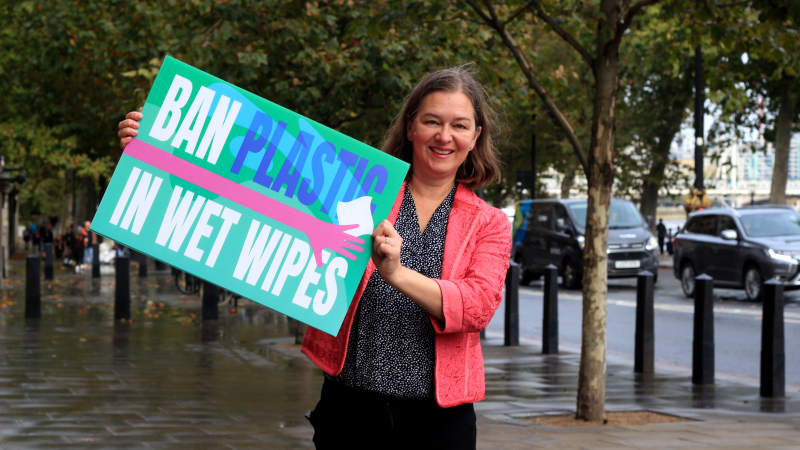
We use a staggering 11 billion wet wipes every year in the UK and 90% of them contain plastic. That plastic is causing untold damage to our water systems and our marine environments, and it is long past time something is done about it. Only a ban can fix the problem fast enough and it is conspicuously absent from the government’s environment bill.
There are 300,000 blockages every year in our sewers, which cost water companies £100m to clear, and around 100 million marine animals die each year globally due to plastic pollution alone. Wet wipes are even changing the shape of our rivers as they pile up on beds and banks. In 2018, Thames21 retrieved over 5,000 wet wipes from the Thames bed during an operation on a 116m stretch of the river.
My ‘ban plastic in wet wipes’ ten-minute rule bill will have its first reading today, Tuesday 2nd November, and the timing couldn’t be better. The demand for hygienic wipes has increased because of the pandemic, and most people aren’t even aware that the majority of wet wipes are a single-use plastic. And the future of our fight against climate change is being decided at COP26.
I was on the environment bill committee and the Tories there rejected every single one of our very reasonable amendments. It is distressing that even as we hurtle towards climate catastrophe, the government is still treating the fight against climate change as a party-political issue.
Flushing the odd wet wipe may not seem like a big deal, but the consequences of doing so are becoming increasingly visible. I recently visited Beckton Sewage Treatment Works to see the 30 tonnes of unflushable materials they have to remove every day, most of which are wet wipes. I’ve also been out at low tide to see thousands of wet wipes washed up on the Thames foreshore.
As a mother of four children, I completely understand the pressures that parents are under and how useful wet wipes are. I also know that parents want to do the right thing for the environment. Rather than trying to work out the confusing packaging and ingredients list, banning plastic in wet wipes is a win for consumers as well as the environment.
On some issues, we can wait for the industry to move ahead with encouragement and consumer pressure. On others, the industry isn’t moving fast enough and a ban is needed to stop the damage to wildlife and the environment urgently.
I have spoken to some companies who produce plastic-free, biodegradable wet wipes in the UK, so we know that it’s possible and also that expanding production could be a source of green jobs. The Industry Association has told me about the encouraging progress they have made so far. I’m just not convinced that the industry will make the changes needed without additional pressure.
I am delighted to have support from cross-party MPs and organisations such as the Marine Conservation Society, Thames 21, the Green Alliance, Water UK, Thames Water, and the WWF. On the face of it, this seems to be the bill that nobody disagrees with.
I am not going to pretend that this is the solution to all our problems, but it is a positive change that we could make right now that would make a huge difference. I want this to be one part of the broader aim of setting and meeting ambitious targets for plastic reduction.
I would encourage everyone to show their support by sharing this on social media with #BanPlasticinWetWipes. For now, I would also encourage everyone to buy plastic-free wet wipes with a ‘fine to flush’ accreditation and to always put your wet wipes in the bin.




More from LabourList
Government abandons plans to delay 30 local elections in England
‘The cost of living crisis is still Britain’s defining political challenge’
‘Nurses are finally getting the recognition they deserve’